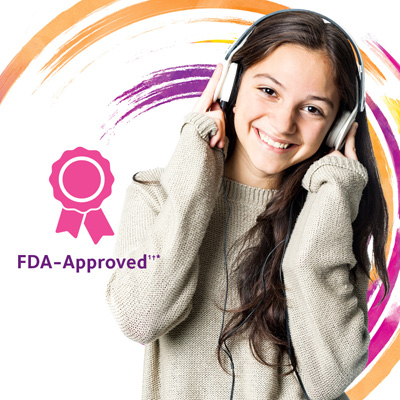
Pediatric Eye Exam
Because many eye problems start at an early age, regular pediatric eye exams are essential to detecting issues early and preserving long-term vision. At Lighthouse Vision, we provide pediatric eye exams in Milford for kids aged seven and older. Our optometrist has the expertise and technology to diagnose and treat eye health and vision problems in children.
Our team understands that visiting the eye doctor can be intimidating for children, which is why we take a gentle and caring approach to kids’ eye exams. We want to make the experience as comfortable and stress-free as possible for both you and your child.
When does your child need to visit the eye doctor?
Children should have their first eye exam at six months, a second at three years old, and a third before entering kindergarten. At Lighthouse Vision in Milford, we will see children aged seven and up. Unless vision correction is needed, school-aged children should have an eye exam every two years. Children who need eyeglasses or contact lenses should be seen annually or as recommended by their eye doctor.
What can you expect during a pediatric eye exam?
Our pediatric eye exams in Milford are tailored to the unique needs of each child, considering their age, visual development, and any specific concerns you may have. Exams generally include a case history, vision testing, determining whether eyeglasses are needed, testing eye alignment, an eye health evaluation, and prescribing eyeglasses if necessary.

Myopia Control
Many children have a condition called myopia, which causes distant objects to appear blurry. If it’s not addressed, myopia often gets worse over time and can raise your child’s risk of serious eye issues.
If our optometrist detects any vision problems or eye health issues during the exam, he will develop a customized treatment plan to fit your child’s exact needs. Dr. Dincher may recommend glasses, contact lenses, or other treatment options to improve your child’s vision and eye health.
Why are eye exams important for children?
Regular pediatric eye exams are critical for detecting and correcting any vision problems that your child may have. Early detection and treatment of vision problems can significantly improve your child’s quality of life, academic performance, and overall well-being.
Vision is essential to learning. Eighty percent of all learning is visual, which means children with vision problems are at a huge disadvantage. Pediatric eye exams ensure children have the following visual skills necessary for effective reading and writing:
- Excellent vision for near, up-close work and distance.
- Comfortable and correct “eye teaming,” which means the eyes work well together and can focus on the same place in space.
- The ability to adjust focus to see clearly at different distances.
- Accurate eye movement skills, such as the ability to read a line of text.
What are the signs of vision problems in children?
It can be difficult to tell if your child is having trouble seeing clearly. Children don’t always tell you when they are having problems seeing, or they may think everyone sees the way they see.
Fortunately, many vision problems and eye issues can be identified during a comprehensive eye exam with a qualified optometrist. If left untreated, these problems can affect a child’s vision permanently and lead to developmental delays and learning issues. Regular pediatric eye exams will help ensure early detection and treatment of issues to avoid lifelong visual impairment.
Here are some common signs that may indicate that your child is experiencing vision problems:
- Frequent blinking, squinting, or irregular eye movements
- Frequently turning or tilting their head
- Covering or closing one eye to see better
- Poor hand-eye coordination or motor skills
- Rubbing their eyes frequently
- Frequent headaches
- Leaning in too close to see something or read
- Learning difficulties and poor handwriting
If your child displays any of these behaviors, they may have a vision or eye health problem and should see our pediatric optometrist in Milford. However, it’s important to remember that your child may show no signs and still have an eye issue. That’s why regular comprehensive eye exams are essential to maintaining good eye health.
Book your child’s pediatric eye exam in Milford today!
At Lighthouse Vision, we offer children’s eye exams for kids ages seven and up in Milford, Orange, West Haven, Stratford, Monroe, and New Haven. Eye diseases can affect people of all ages, even children. Don’t wait until your child is struggling in school or showing signs of vision problems. Schedule a visit with our pediatric optometrist in Milford, CT, today to ensure that your child’s vision is healthy and strong. We look forward to seeing you and your child soon!
When should my child's eyes be examined?
As early as six months by a pediatric optometrist or ophthalmologist. We will see ages seven and up at Lighthouse Vision.
Will sitting too close to the television set hurt my child's eyes?
It can cause eye strain. The best way to slow down myopia (nearsightedness) progression is to spend at least 90 minutes outside per day at least five days a week.
Is my child likely to inherit my need for glasses?
There is a small genetic component to myopia (nearsightedness), but environmental factors like spending too much time inside are more important than genetics.

